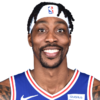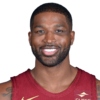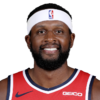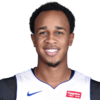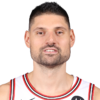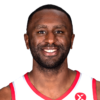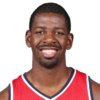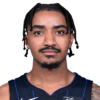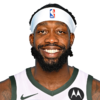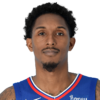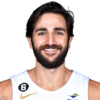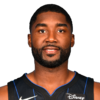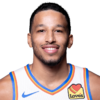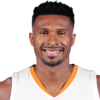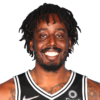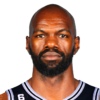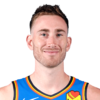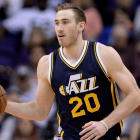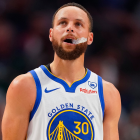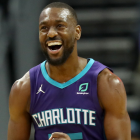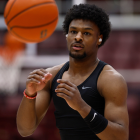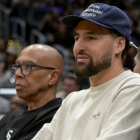The terms "overrated" and "underrated" are practically gold stamped into our collective sports lexicon, and they can mean something different to everyone. In general, however, for a player to be considered truly underrated, he has to check off two sets of criteria:
One, he has to be largely unknown (in most instances) to casual sports fans who don't live and die with the NBA, and two, his skills have to be generally under-appreciated by the informed.
By and large, the players that into both these categories aren't superstars (there are some stars, though). What they are, strictly speaking, are players that help their teams win every night. Given the importance of these players, we went through and found the most underrated player on each team, and in doing so, a few interesting things stood out.
- 1. A surprising number of stretch fours showed up on the list. Even with how prevalent small-ball has become, it's still surprising that these players fell between the cracks.
- 2. A lot of these players were free agents that signed with new teams this summer. It shows you that with a weak free agency class, there were good players to find, many who came on cheap deals.
Now, here's the list ...
EASTERN CONFERENCE
 Atlanta Hawks
Atlanta Hawks
OK, so right off the bat, the Hawks are one of several teams that you could classify as collectively underrated. There isn't a properly rated player on their roster, not even All-Star Paul Millsap. I wanted to go with Mike Muscala, who legitimately has the talent to be a rotation player, but he just hasn't gotten enough floor time for Atlanta.
So we're going with Dwight. Howard still has many of the flaws he's always had; he tries to post-up too much and while he seems likable as far as teammates go, he also never sets a tone. But here's the thing: Even if you ignore the efforts Howard has made to change the perception of his maturity, his overall impact still matters. He was 98th percentile on non-post-ups last year around the rim. Those are easy shots, but they are also shots you need to make because they're easy. He's a finisher, and that matters.
Defensively, the Rockets never really let Howard switch out on pick and rolls. Maybe he's not capable of that anymore, but it'll be interesting to see if the Hawks use him in more effective ways than the Rockets did, which often left him defensively neutralized on non-rolling bigs. He was typically showing before screens so hard that it made it easy for the guard to go away from the pick and get an easy opportunity.
But Howard is still really impactful as a rim protector. When he's engaged, he can flat-out make plays.
Howard may never be the great player he once was, but he's certainly better than the public paints him.
 Boston Celtics
Boston Celtics
Jerebko played 15 minutes per game last season, and averaged a whopping 4.4 points. It's likely he plays more this season. He did take on a much larger role in the playoffs out of necessity, and the truth is that before Al Horford showed up, Jerebko was one of the few Celtics bigs you could trust on both ends of the floor in any number of situations. (Amir Johnson would be another.)
Jerebko shot 40 percent from deep and can switch onto any opponent. He's smart, consistent and reliable. He's a guy that helps his team and no one's really noticed his impact.
 Brooklyn Nets
Brooklyn Nets
For the modern NBA, Booker is a great backup power forward. He's a hustle junkie with a constant motor. He's particularly adept at ruining pick and rolls, creating a turnover 18.5 percent of the time last season, even in a down year. He needs to get his offense back up to speed with Brooklyn, but he's a guy who can help make crucial plays off the bench for a team that needs a lot of help this season.
Admittedly, finding anyone on the Nets who is rated at all is pretty tough this year.
 Charlotte Hornets
Charlotte Hornets
Marvin Williams was 95th percentile in individual offense per possession last season. That means only 5 percent of all NBA players with at least one possession were better. He had a 54 percent effective field goal percentage in the pick and pop, and averaged 11.2 rebounds per 100 possessions. Oh, and he's a great defender.
Basically, 25 out of 30 teams need to trade for Marvin Williams because of what he specifically does in today's NBA.
 Chicago Bulls
Chicago Bulls
Grant had a hard time getting time for the Knicks last year. You know how it is for rookies when they're on contending teams. Oh wait, the Knicks were awful. Well, it's probably his fault and not the system's. Oh wait, the Triangle is a mental prison for point guards. Grant is a terror in transition and has a natural aggressiveness to him that could absolutely thrive in Fred Hoiberg's system. This kid can play. In the end, he could end up being another salvaged refugee from what the Triangle does to point guards.
 Cleveland Cavaliers
Cleveland Cavaliers
Against the Warriors in the Finals, when Tristan Thompson was on the bench, Golden State scored 117.1 points per 100 possessions. In other words, the Cavs' defense bled to death. On the other hand, when Thompson was in, the Warriors scored 98.6 points per 100 possessions. The mighty Golden State offense suffocated.
Thompson's sheer athleticism and aggressiveness changes the complexion of games, and his ability to switch out onto guards and contain dribble penetration is among the best in the league. Thompson has no offensive game to speak of, but he's a much bigger part of Cleveland's structural makeup than he's given credit for.
 Detroit Pistons
Detroit Pistons
Leuer was a long-term project in Memphis that the Grizzlies ran out of time to fund. Then last year in Phoenix he started to thrive. He's been added to a bench unit for Detroit that was truly awful last year and should do great things in Stan Van Gundy's offense. Leuer was 91st percentile in pick-and-pop situations last year, and it's not just his range that hurts you. If you close out on him, he can slice between defenders.
Of note, this is also a default choice, as every advanced metric pours urine on Aron Baynes' impact, and the Detroit starters are all slightly overrated by virtue of how good they are as a collective unit, rather than individually.
 Indiana Pacers
Indiana Pacers
The other "East Coast Splash Brother," Miles was blisteringly hot to start last year, then tailed off and wound up losing out in the rotation. It'll be interesting to see what he does in Nate McMillan's system. Miles is a crack shooter, but he's also quick and elusive off the dribble. Miles is also a plus defender. Monta Ellis may have it all, as he claims, but depending on how this season goes, C.J. Miles could wind up with the starting 2-guard spot for Indy.
 Miami Heat
Miami Heat
Waiters got a bad deal in free agency. He finally showed last year that he can be a major contributor to a contender. He didn't try to do too much for OKC, he just fit in. Waiters was huge in their playoff run, especially against the Spurs.
Waiters made serious plays in the playoffs, on both ends. His reward was being left in restricted free agency until the well was dry in the aftermath of Kevin Durant's decision, and then signing for less than market value with the Heat. Tough break, but if he comes into his own this season, he can finally live up to the potential that made him a No. 4 overall draft pick in 2012, ahead of Damian Lillard and Andre Drummond.
 Milwaukee Bucks
Milwaukee Bucks
Henson keeps losing minutes, and it's kind of perplexing. He certainly doesn't stretch the floor -- Synergy has him logged for 11 jump shots last year -- but he's a great finisher around the rim and the defense was four points better with him on the floor.
Henson was second among all players playing at least 15 minutes per game in blocks per 100 possessions. His re-jump is ridiculous.
 New York Knicks
New York Knicks
You go up and down the Knicks' starting unit and there are question marks. Can Derrick Rose and Joakim Noah stay healthy? Can Melo keep up his passing and physical play from the past two seasons? Can Porzingis avoid a sophomore slump now that the book is out on him?
Then there's Courtney Lee, who is just a reliable veteran wing. He plays great defense, and has shot 37 percent or better in each of the past six seasons. He's able to slither to the rim for quick layups, fits into any system, and manages his role in terrific fashion. He's good to play off the bench or as a starter. No one talks about Lee, but given some of the monumental limitations of a lot of the 2-guard crop in the NBA, Lee deserves better recognition for what he brings to the table.
 Orlando Magic
Orlando Magic
Not only is Vucevic underrated by most casual fans, he seems to be underrated by his own team, considering the way Orlando structured its offseason, adding Serge Ibaka (who will likely play some small-ball center) and Bismack Biyombo on a huge new deal. Vucevic seems to be trade bait, and while he's very limited defensively and can't spread the floor to the arc, he's still a terrific scorer and rebounder.
If he gets dealt, the team that trades for him gets a starting-caliber center. He's individually underrated; he's just hard to find a power forward pairing with.
 Philadelphia 76ers
Philadelphia 76ers
Did you know Bayless was a monster prospect? Cover of magazines and everything. He never lived up to the hype, but he also has become a really solid combo guard. Bayless shot a career-high 44 percent last season from deep and while he's still limited defensively, he's not a monster negative and he has the potential to step up and not be a drain in big situations. He's far from consistent on either end, but he's also a really talented scorer and can set your offense well. He'll help the Sixers.
 Toronto Raptors
Toronto Raptors
"2PAT" is actually a bit of a problem for the Raptors. He's too good to make upgrading the power forward spot an urgent priority, but not good enough to lock down the position.
However, Patterson's value is pretty high in the modern NBA. He's a reliable stretch four who can hit from the outside and is athletic enough to contain perimeter players. His rebounding slid last year but is still a strength overall. He helps spread the floor and can crash the offensive glass.
 Washington Wizards
Washington Wizards
Another stretch four, Nicholson was one of my free-agent steals before it all got rolling, and Washington got him at a great price. Offensively, Nicholson is just as capable as Patterson -- he struggles in isolation coverage, but within a system, he's very good, ranking in the 93rd percentile defensively via Synergy Sports.
WESTERN CONFERENCE
 Dallas Mavericks
Dallas Mavericks
Everyone was in a rush to bury Bogut the past two years in favor of the oh-so-chic "Death Lineup" in Golden State. But if you think that the Warriors losing a 3-1 lead in the Finals and Bogut going down with an injury (among other factors) are unrelated, you weren't really paying attention.
Bogut is injury prone, slow, and can't shoot. He's also a terrific rim protector and generally a huge pain to deal with in the paint. When he fouls you, you know it. When he screens you, you know it. When he hits you, you know it. Bogut's still pretty decent at getting put-backs and is a smart passer. The Warriors let Bogut go to get Kevin Durant, and it's hard to blame them for that. But there's very little doubt that Bogut is underrated at this point.
 Denver Nuggets
Denver Nuggets
Gary Harris is short. There's just no way of getting around it. He's 6-3 at shooting guard. Here's the thing, though: Harris has learned to attack shooters on the catch instead of trying to contest the actual shot. He disrupts dribbles, shades to help, and basically found ways to be a quality defender (despite really poor advanced metrics indicators) last season. He also added something new to his offensive game with every game, and his notably well-developed shot came through for him as he shot 35 percent from deep.
Harris' size is a detriment, but everything else about his game forecasts a promising season.
 Golden State Warriors
Golden State Warriors
Livingston is a change-up point guard. Instead of Stephen Curry's infinite range, underrated quickness and incomprehensible handle, Livingston is a post-up expert who dominates with his height and size.
He rarely gets credit for how much he helps stabilize the second unit due to Andre Iguodala (who mainly plays with the starters) and his defensive dominance. But Livingston is just as crucial to Golden State, and will be even more so this season with a shortened bench.
 Houston Rockets
Houston Rockets
Beverley made his name with his aggressive, borderline reckless defense (many just call it flat-out dirty), but he's also shored up his offensive weaknesses. He shot 40 percent from beyond the arc last season and while his (and every member of Houston's) defense took a step backward last year, he's still highly disruptive. He's a good two-way starting point guard.
He's particularly disruptive on-ball. He's like a mosquito... the size of a wolverine.
 Los Angeles Clippers
Los Angeles Clippers
Most of the Clippers are properly rated -- though Blake Griffin at this point is extremely close to being underrated. Johnson, though, is interesting. He's not a great shooter (33 percent from deep last year). He's not a playmaker or rebounder. He's just a guy on offense. But he does play good defense and has managed to hang onto a rotation spot. It's tough to predict he'll have a very good year, but it's also hard to say he'll have a bad one. For this thin Clippers bench, that's pretty good.
 Los Angeles Lakers
Los Angeles Lakers
How do you go from Sixth Man of the Year to underrated inside of a year? Play for the Lakers. The only other candidate here is Timofey Mozgov, and while Mozzy may have some more good seasons left in him, Williams is a more useful player. There are a host of issues with Wililams. He's not terribly efficient, his defense is poor and he's one dimensional. But that one dimension is terrific. He's a bench scorer, and he gets buckets. That's still valuable.
 Memphis Grizzlies
Memphis Grizzlies
The Grindfather has been wiped away in most people's minds since the Warriors stopped defending him 18 months ago. But Allen is considered a top-flight defender for a reason. There are good defenders, there are great defenders, and then there's Tony Allen who makes a huge difference all on his own.
Throw in the fact that he's a great slasher and that every plus-minus data point suggests he helps Memphis win and it's time to chill with the idea that just because Allen can't knock down a three to save his soul, he can't help a team be great. He can, and does.
 Minnesota Timberwolves
Minnesota Timberwolves
Rubio entered the league with insane hype, and has largely underperformed relative to that thanks to the "Dr. Dre's 'Detox'" of jump shots. (One day it's going to be released.) But now he's largely been cast aside, and any examination of the Wolves' plus-minus data on any level indicates he makes the team better on both ends of the floor. A brilliant passer and supremely underrated defender, if Rubio is traded he's going to help the next team he's on.
 New Orleans Pelicans
New Orleans Pelicans
The Pelicans' free agent signee proved in Chicago last year that he can be a real 3-and-D weapon, hitting over 40 percent from deep for the first time in his career and averaging 1.5 steals per 100 possessions. He's a good defender who can also shoot, slash, and make a few plays. He's going to surprise people with his impact for the Pelicans.
 Oklahoma City Thunder
Oklahoma City Thunder
The Thunder don't beat the Spurs without Roberson stepping up and knocking down key shots. His shot is always going to be a concern but his effort, defense, athleticism and ability to blend into a top-notch team are not.
 Phoenix Suns
Phoenix Suns
Barbosa was phenomenal for the Warriors the past two years; they'll truly miss him in the Bay. Without Barbosa, they don't win the first two games of the Finals to take that 3-1 series lead they eventually fumbled away. He remains crazy fast, and has such a great ability to seamlessly slip into whatever lineup he's in and fill a role. The Brazillian Blur will give the Suns a great counter-look, even with all their good guards this season.
 Portland Trail Blazers
Portland Trail Blazers
I've been driving the Al-Farouq Aminu wagon since he was in New Orleans two years ago. (And man, could they have used him the past two seasons.) Aminu's defense is sound and stealth. He's rarely out of position, and he's able to create transition opportunities with quick hands that disrupt plays.
The knock was always offense, but he solved that. Under Terry Stotts' wizarding world, Aminu shot 36 percent from deep last season. He's a well-rounded combo forward who might wind up really being a part of this Blazers core.
 Sacramento Kings
Sacramento Kings
Koufos may be on the best value contract in the league outside of Stephen Curry. For $8 million a year, Koufos plays 20 minutes of solid defense, provides good rebounding and shoots over 50 percent. He's good enough offensively that you can't completely ignore him and he consistently makes defensive plays. He's struggled in Sacramento on a dysfunctional team, but any team that looks to acquire Rudy Gay via trade should try and sneak Koufos into the deal as well. Given the current state of the NBA, Koufos' rim protection might be more valuable than anything Gay offers.
 San Antonio Spurs
San Antonio Spurs
The Spurs really are the anti-Lakers. Nearly everyone on this team is underrated. Dedmon is 26 in his third year in the league and has worked his way up from the D-League. He's a really solid rim protector and standard big man for a team that is all of a sudden lacking in front-court depth. He'll outperform expectations like all these guys the Spurs sign do, and we'll all wonder how the Spurs saw what so few others did.
 Utah Jazz
Utah Jazz
That's right, the Jazz' best player is underrated. Hayward never gets mentioned among the top small forwards in the league, despite being a great defender and playmaker and an efficient scorer. Just look at how he stacks up in per-possession production:
Hayward is a free agent next summer and he needs to be at the top of everyone's list. He can't be the best player on a championship team, but he can absolutely be the second best.



